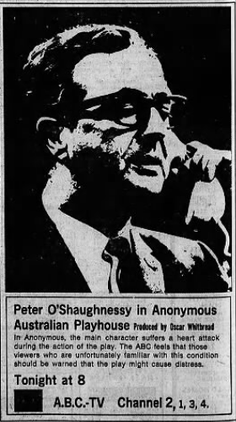Related Research Articles
"Campaign for One" is a 1965 Australian television film. A remake of an episode of the BBC series Wednesday Play, it aired in a 60-minute time-slot on ABC on 24 November 1965 in Melbourne, Sydney, and on 5 January 1966 in Brisbane. as part of Wednesday Theatre.
Australian Playhouse was an Australian anthology TV series featuring the work of Australian writers.
Swamp Creatures is a play by the Australian author Alan Seymour. He wrote it for radio, stage and TV. It was Seymour's first produced play.
Patricia Mary Byson Flower was an English Australian writer of plays, television plays and novels.
The Cell is an Australian play by Robert Wales. The setting is in a school for delinquent girls.
"Tartuffe" is a 1965 Australian television film directed by Henri Safran and starring Tony Bonner and Ron Haddrick. It was an episode of Wednesday Theatre and filmed in Sydney at ABC's Gore Hill Studios. It aired on 13 October 1965 in Sydney and Melbourne, and on 20 October 1965 in Brisbane.
"Point of Departure" is a 1966 Australian television film. It screened as part of Wednesday Theatre. Australian TV drama was relatively rare at the time. "Point of Departure" aired on 22 June 1966 in Sydney, on 29 June 1966 in Melbourne, and on 27 July 1966 in Brisbane.
"The Pigeon" is the first television play episode of the first season of the Australian anthology television series Australian Playhouse. "The Pigeon" was written by Peter Finnane and directed by Eric Taylor and originally aired on ABC on 18 April 1966.
"The Tape Recorder" is the second television play episode of the first season of the Australian anthology television series Australian Playhouse. "The Tape Recorder" was written by Pat Flower and directed by Henri Safran and originally aired on ABC on 25 April 1966.
"The Prowler" is the fourth television play episode of the first season of the Australian anthology television series Australian Playhouse. "The Prowler" was written by Pat Flower and directed by Alan Burke and originally aired on ABC on 9 May 1966.
"Johnny Belinda" was a 1959 Australian TV adaptation of the 1940 play by Elmer Harris which had been filmed in 1948. It was the first "live" one hour drama on commercial television in Australia.
"Plain Jane" is a 1966 Australian TV movie. It stars Elspeth Ballantyne and was produced by Oscar Whitbread for the ABC. "Plain Jane" aired on 5 January 1966 in Sydney and Melbourne, and on 25 May 1966 in Brisbane.
"The Winds of Green Monday" is a 1965 Australian television play by Michael Noonan. It aired as part of Wednesday Theatre on August 4, 1965 in Sydney and Melbourne, and on 1 September 1965 in Brisbane. It starred Terry Norris and was directed by Oscar Whitbread.

"Anonymous" is the 11th television play episode of the first season of the Australian anthology television series Australian Playhouse. "Anonymous" was written by Pat Flower and originally aired on ABC on 27 June 1966.
"Easy Terms" is the 28th television play episode of the first season of the Australian anthology television series Australian Playhouse. "Easy Terms" was written by Pat Flower and originally aired on ABC on 24 October 1966.
"Dangerous Corner" is a 1965 Australian television play based on the play Dangerous Corner by J.B. Priestley. It was filmed in Melbourne.
"Done Away With It" is the 16th television play episode of the first season of the Australian anthology television series Australian Playhouse. "Done Away With It" was written by Pat Flower and directed by Henri Safran and originally aired on ABC on 1 August 1966.
"The Monkey Cage" is the 10th television play episode of the first season of the Australian anthology television series Australian Playhouse. "The Monkey Cage" was written by Ruth Funner and directed by Wilf Buckler and originally aired on ABC on 20 June 1966. The episode was shot in Brisbane.
"Antigone" is a 1966 Australian TV play directed by Patrick Barton. It was made to celebrate the 2,500th anniversary of Greek Theatre.
"Romeo and Juliet" is a 1967 Australian TV play based on the play by William Shakespeare. It was presented as part of the Love and War anthology series on the ABC.
References
- ↑ "LOVELY LIZA". Tribune . No. 1475. New South Wales, Australia. 7 September 1966. p. 10. Retrieved 26 February 2019– via National Library of Australia.
- ↑ "Adolescent impulses". The Canberra Times . Vol. 41, no. 11, 481. Australian Capital Territory, Australia. 12 September 1966. p. 15. Retrieved 26 February 2019– via National Library of Australia.
- ↑ "TV Guide". 8 September 1966. p. 29.
- ↑ "Double Play with Fire". The Age . 8 September 1966. p. 12.
- ↑ "TV Guide". The Sydney Morning Herald . 12 September 1966. p. 15.
- ↑ Darlington, Dorothy (13 September 1966). "A Play for an Actress". The Sydney Morning Herald . p. 16.
- ↑ Marshall, Valda (18 September 1966). "Liza's Party Piece". The Sydney Morning Herald . p. 85.
- ↑ "TELEVISION". The Canberra Times . Vol. 41, no. 11, 482. Australian Capital Territory, Australia. 13 September 1966. p. 14. Retrieved 26 February 2019– via National Library of Australia.